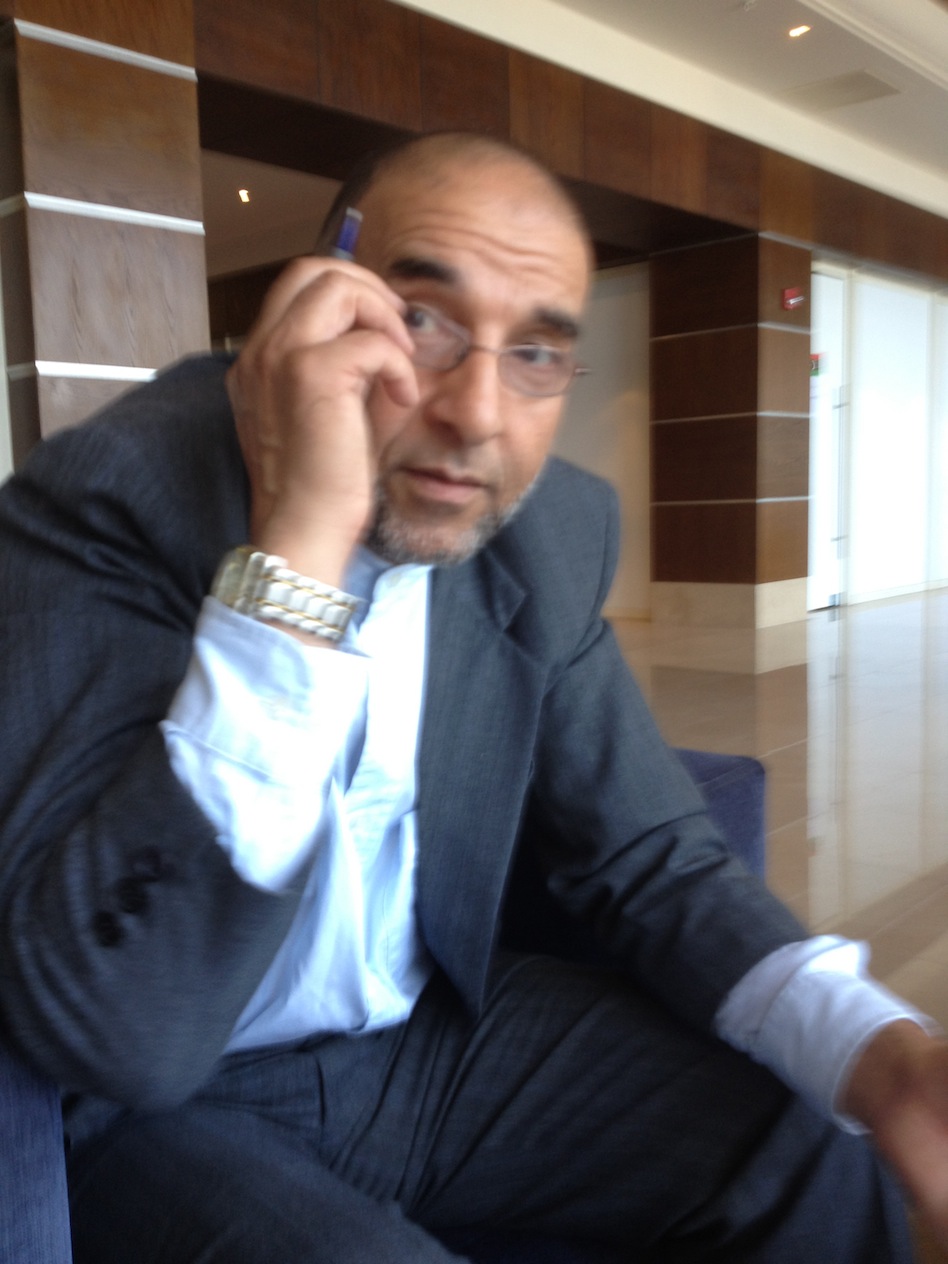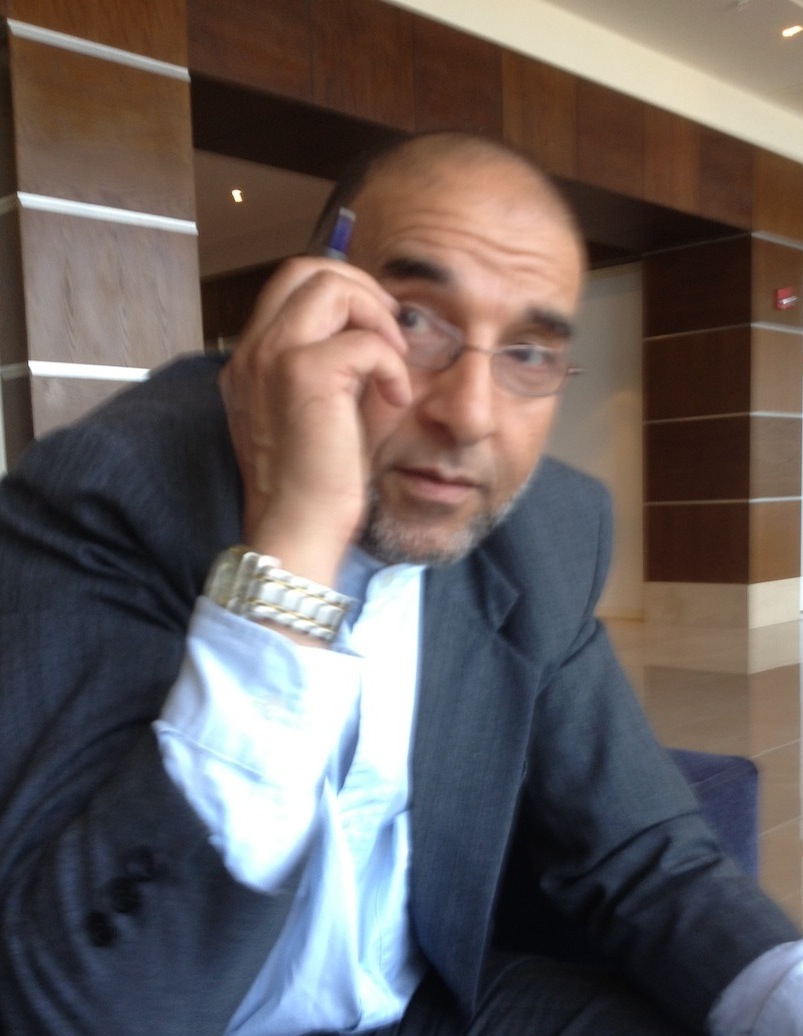By Michel Cousins.
Tripoli, 10 September:
Mohamed Berween would probably be . . .[restrict]one of the first to admit that he is not a frontrunner in the election to become prime minister at the moment. But with the race seemingly gridlocked there is all to play for. He hopes to be the man who comes up through the middle on 12 September, the man whom the Congress members decide they can rally round.
It has been a long journey getting to the point of being a candidate to govern Libya.
Having been active in student opposition politics at Benghazi’s Garyounis University in 1975 and 1976, he decided to leave the country. He went to Portland State University in Oregon in 1977 to study Public Administration and Political Science. Realising he could not return to Libya, he applied for political asylum in the US where he became active in opposition student politics, being president of the Libyan Students Union from 1983 to 1985.
Unlike in the UK where Libya opposition figures were targeted, and some murdered, by the Qaddafi regime, the life in US was easier. “There were no direct threats”, Berween said in an interview with the Libya Herald. Every Libyan in the US was taking precautions against the dictator’s agents but “they could not do much during the Reagan administration.”
Then he started an academic career focussing strongly on Islam, democracy and political pluralism which ultimately led to his becoming Professor of Politics and Administration at Texas A & M University.
Neither Berween nor his wife Amar have taken US nationality so they have no problem with the GNC’s ruling that neither the prime minister nor the ministers of Foreign Affairs, the Interior and Defence nor their spouses can have dual nationality. In all their years in the US they remained in political asylum — although their sons Zakaria, 21, Yusuf, 20, and Abdurrahman, 11, hold US passports, being born there. The elder sons remain in Texas where they are students. The youngest is now at school in Libya.
Being registered as asylum seekers had its drawbacks when the revolution started last year. “Being an exile, I could not get documents to leave. It took six months.” However, his US-born son Yusuf was determined to get involved and arrived in Libya in March. “I allowed him to go, but he volunteered.” While waiting to get travel documents, Berween “participated by writing and giving interviews” in support of the revolution.
He finally arrived back in Libya in December, 33 years after he had left. Returning home to Misrata, he then started giving talks about democracy and the electoral process. “This gave local people the impression that I might have something to offer”, he says. The upshot was that he was asked to head the commission to organise Misrata’s local council elections.
By any standards, he did a remarkable job: registering voters, devising the voting system, vetting candidates, organising and overseeing the vote — and all on a shoestring budget, and in just two months. The whole process had to be done from scratch.
It brought him national recognition and respect. Since then, he has been asked to brief several towns and cities on the local electoral road map that he created — Tripoli, Khoms, Zliten, Derna as well Emsalata, Gharian, Sabratha, Ajdabiya, Sebha, Ghat and Ghadames have all wanted to hear his ideas. In effect, they became the local election guidebook and he the guide. Such was his standing that, prior to the elections for the National Congress, there were many voices saying that he should organise them.
Others had loftier ideas. He was asked by local people in Misrata to stand as a candidate. “I declined”, he says. “But they found this difficult.”
After the elections, a number of people and organisations then petitioned him to stand for the post of prime minister. Berween will not name them, saying simply they were “civil society groups, smaller parties not in Congress and Libyan national figures”.
He says that he was initially reluctant. “It is not something you chose to do.” But he nonetheless decided that “it was my national duty to give it a shot”. Libya, he says, is in danger because of weak government, continued corruption and too many men with guns. The country needs “decent and faithful Libyans to unite and put it on the right track”.
There are three main components to his platform: strong government, effective structures and priorities for what will, he points out, be a relatively short term for the next government — one and a half years at most.
What he means by ‘effective structures’ is that the government has to know the scale of demand on its services. “We must start from basics”, he says. “We have to know how many people there are.”
He wants a national census within four months of the new government taking office. He points to the scandal over the NTC’s payout to the revolutionaries, with billions flowing out of the government’s coffers simply because it did not know to whom and to how many people it was paying the money.
As a result of the census, everyone would be issued a National ID number which would replace all the other documentation — the different family books and identity cards — as the basis of the citizen’s relationship with the state, rather like a social security number in the US. Berween believes that this would help cut down corruption by preventing people having multiple identities. It would also end the situation where the dead and people who never existed have claimed and been paid benefits.
“If we don’t know how many people there are, we cannot talk about strategic plans and investment.”
Knowing where the people are also means that funding for local services could be spent more efficiently — more going to the places where there are more people.
Another of the structures he wants to put in place are associations of local councils. These would be regional groupings of local council leaders. Each association would meet with the prime minister once a month to discuss the local plans and financial requirements. If the plans were approved, the funding would be provided. But the government would require accounts, he says, and these would be published. Local civil society groups would be encouraged to monitor the progress of projects. Councils that did not deliver would not necessarily be punished: they might be given another chance. But not a second one, he insists. If they then did not do what they promised or wasted funds, they would be penalised.
Berween sees this as a temporary step while the Constitutional Commission works out how local government should operate in Libya.
Another strategic change he wants to see is an end to the 1968 law, which the Qaddafi regime continued and which still operates, under which there is up to a six-month delay between a government budget being approved and the money being made available by the Central Bank to the various ministries and government departments. It is, he says, why despite the 2012 budget being passed in March, funds were not made available till July, preventing ministries from putting plans into action. It hits ordinary people, he says, pointing out that it is the reason why so many teachers and other government employees were not paid for several months.
Berween lists the priorities for his year and a half in office: national security, healthcare, education, the economy, jobs and housing.
Getting rid of the weapons on the street is key to security. There has to be strong government, he says, and it alone must control the use of force in the country. The mountain of privately held weapons has to go. No real revolutionary, he says, can be an arbiter of the revolution.
Salaries are another of his priorities. Libyans are being paid too little, he says. He wants a minimum wage. It should be LD 1,000 a month. “We have the money.” He believes that it would create a more dynamic and competitive market — as well as being fair.
On healthcare, there has to be major investment. But it will be difficult to build, equip and open hospitals and clinics in a year and a half, although projects must be started, he insists. In the meantime, his government would bring in mobile hospitals as well as hospital ships. “We’ve spent $4 billion in the past six months sending Libyans out of the country for treatment”. It has not been a great success, he says. Many have not been cured. Better to bring the treatment and facilities to Libya.
Meanwhile there would be free medicare for everyone under 15 years of age.
Berween also wants to see a genuine separation of powers between the government and Congress. Congress is there to make the laws, he says, but the government “must have the means to make policies”. Simply put, he does not want to see the situation that existed under the NTC where it would occasionally decide policies and expect the government, which had not been consulted, to implement them. He would work together with the head of Congress, he says, to ensure smooth government. And as prime minister, he would give a progress report to Congress every four months.
Berween calls himself a Jeffersonian — which entails a fundamental belief in democracy, equality of political opportunity and in government operating for the benefit of the people, not of vested interest groups.
“You have to accept the results of the democratic process”, he declares, even if one does not like them. Without that, there is no democracy, he points out.
He put that belief into practice last month when he was called upon to preside over the election of a new leader and deputy leader of Misrata local council to replace the two men who had resigned. When a member of the Muslim Brotherhood, Salim Beit Almal, was elected and revolutionaries attending the election then objected and demanded the election be annulled, Berween refused saying that the result was the democratic choice and had to be respected.
Berween is a pragmatist, but he is passionate about democracy in Libya and the rule of the majority. Looking out of the window of Tripoli’s Mehari Radisson Blu hotel to the rubble across the road that is all that remains of the Sidi Al-Sha’ab Al-Dahmani shrine and mosque, he had harsh words for the Salafists who have destroyed it and other Sufi shrines across the country. They had no right to act as they did. It was a clear case of a minority imposing its will on the majority, and by force.
As for his equally passionate believe in justice, he has an interesting way of putting it. “We should not talk about justice, but about avoiding injustice”, he says. That is the way, he believes, Libya can become a society that prevents corruption and oppression, be it to women, to minority groups — to anyone.
A forth block of independent members of Congress has emerged in recent days that reportedly supports none of the three front runners for prime minister: Mahmoud Jibril, Mustafa Abushagur or Awad Barasi. It is estimated as having as many as 35 members.
Several are said to support Berween.
[/restrict]











